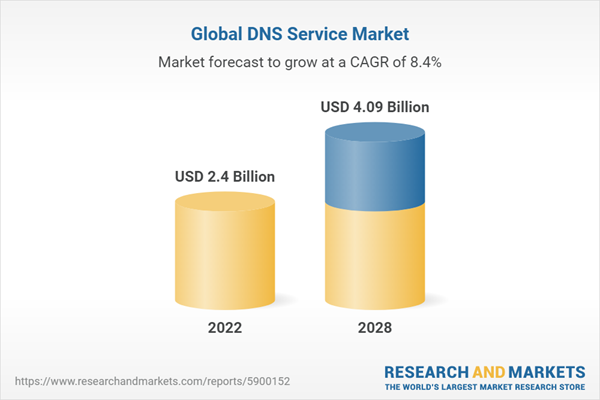Dublin, Nov. 23, 2023 (GLOBE NEWSWIRE) — The “DNS Service Market – Global Industry Size, Share, Trends Opportunity, and Forecast, 2028F” report has been added to ResearchAndMarkets.com’s offering.
This report offers comprehensive insights into the DNS (Domain Name System) Service Market, including market size, growth trends, and key drivers.
The Global DNS Service Market has shown robust growth, reaching a value of USD 2.4 billion in 2022, and is poised to continue expanding at a Compound Annual Growth Rate (CAGR) of 8.4% through 2028. DNS services are integral to the functioning of the internet, translating human-readable domain names into IP addresses, enabling users’ access to websites and online resources. This market’s growth is driven by the rising demand for secure, efficient, and highly available DNS solutions. These solutions support the increasing online presence of businesses and the growing reliance on the internet for various activities.
The DNS service market is witnessing unprecedented growth, fueled by the increasing need for secure, efficient domain name resolution. Businesses, including those in the certified translation office sector, rely on robust DNS infrastructure to ensure seamless digital operations. Rising cyber threats and demand for faster connectivity further accelerate market expansion.
Key Market Drivers
1. Increasing Internet Penetration: The rapid expansion of the internet and the growing number of internet users worldwide are driving the demand for DNS services. DNS services play a crucial role in facilitating the translation of domain names into IP addresses, ensuring smooth and uninterrupted internet access. The internet has experienced exponential growth in recent years, with millions of new users joining daily, thanks to technology advancements, affordable internet access, and the proliferation of connected devices. This surge in internet adoption has led to a higher demand for efficient and reliable DNS infrastructure to meet user expectations for fast and seamless access to websites and online services.
2. Growing Emphasis on Internet Security: In a landscape of escalating cyber threats and attacks, organizations prioritize fortifying internet security. DNS services have become central to a robust security infrastructure, playing a pivotal role in detecting and mitigating diverse cyber threats. These include Distributed Denial of Service (DDoS) attacks, malware infiltrations, and phishing attempts. DNS service providers proactively integrate advanced security features into their offerings, including threat intelligence mechanisms and DNS filtering. Implementing DNSSEC (Domain Name System Security Extensions) adds an additional layer of security by validating DNS data authenticity and integrity, mitigating DNS cache poisoning and other DNS-related attacks.
3. Cloud Adoption and Hybrid Environments: The adoption of cloud computing and the proliferation of hybrid IT environments are driving the demand for DNS services. Cloud-based DNS solutions offer scalability, flexibility, and robust availability, making them ideal for organizations transitioning to cloud-centric operations. These solutions can adapt to shifting workloads and traffic patterns, accommodating the dynamic requirements of modern businesses. Furthermore, they seamlessly integrate with both on-premises and cloud-based systems, ensuring consistent and reliable connectivity. Organizations benefit from simplified DNS management and a seamless user experience.
4. Internet of Things (IoT) Expansion: The rapid proliferation of IoT devices, from smart sensors to connected appliances, has introduced challenges in DNS management. IoT devices rely heavily on DNS services to establish their connection to the internet and facilitate communication with other devices and services. Scalable and efficient DNS solutions are imperative to manage the surge in DNS traffic resulting from the growing IoT ecosystem. DNS service providers are developing specialized solutions tailored to meet the unique demands of IoT deployments, ensuring agility and responsiveness for seamless device connectivity.
5. Global Expansion of Businesses: Expanding global business operations drive the demand for DNS services that can accommodate international presence effectively. Global DNS services strategically deploy geographically distributed DNS servers worldwide, ensuring organizations efficiently deliver content and services to users regardless of their location. This reduces latency and enhances the end-user experience on a global scale. Global DNS services leverage advanced routing techniques, including Anycast, to orchestrate efficient DNS traffic flow, reducing latency and enhancing overall performance.
Key Market Challenges
1. Lack of Standardization and Compatibility: The lack of standardization and compatibility across different DNS service providers presents a major challenge. Each provider may have its own protocols, configurations, and management tools, making it difficult for organizations to seamlessly collaborate and integrate their DNS services. Standardization efforts are needed to establish common protocols and standards to promote interoperability.
2. Resistance to Change and Adoption: Implementing DNS services may face resistance from employees and stakeholders. Resistance to change can stem from a lack of understanding about the benefits, concerns about disruptions to existing infrastructure, or fear of potential security vulnerabilities. Overcoming this challenge requires effective change management strategies, including comprehensive communication and training programs.
3. Complexity and Integration Challenges: DNS service implementations can be complex, particularly when integrating with existing IT infrastructure and systems. Legacy systems, diverse network architectures, and complex DNS configurations can create integration challenges, leading to delays, inconsistencies, and suboptimal performance. Robust integration capabilities and comprehensive planning are crucial to ensure smooth integration.
4. Managing DNS Performance and Reliability: Ensuring optimal DNS performance and reliability can be challenging, especially with large-scale networks and high DNS query volumes. Failure to meet performance and reliability expectations can result in website downtime, user frustration, and revenue loss. Proactive performance monitoring, capacity planning, and load balancing strategies are essential.
5. Security and Privacy Concerns: Security and privacy are significant challenges. DNS services must adhere to industry best practices and regulatory requirements to protect sensitive data and user privacy. This includes implementing robust security measures, such as DNSSEC, DDoS protection, and encryption, and conducting regular security audits and vulnerability assessments.
Key Market Trends
1. Shift towards Cloud-based DNS Solutions: The Global DNS Service Market is experiencing a significant shift towards cloud-based solutions due to their scalability, flexibility, and cost-effectiveness. Cloud-based DNS services offer high availability and global scalability, advanced security features, and are preferred by businesses seeking efficient DNS infrastructure.
2. Integration of Artificial Intelligence and Automation: AI and automation technologies are being integrated into DNS solutions. AI-powered DNS solutions analyze traffic patterns, detect anomalies, and mitigate potential DNS attacks. Automation streamlines DNS management processes, enhancing operational efficiency.
3. Focus on Security and Threat Intelligence: Security and threat intelligence features are gaining prominence in DNS services. Advanced security measures, including DNS firewalling, traffic analysis, and threat intelligence feeds, are offered to protect against DNS-based attacks.
4. Emphasis on Performance and Global Reach: Performance and global reach are key considerations. DNS service providers invest in global infrastructure and leverage technologies like DNS load balancing to deliver low-latency and high-performance DNS resolution.
5. Enhanced Analytics and Reporting Capabilities: Analytics and reporting tools provide insights into DNS traffic, performance metrics, and potential issues. Predictive analytics anticipates DNS traffic patterns, facilitating capacity planning and optimization.
Segmental Insights
Deployment Insights: Cloud-based deployments dominate the Global DNS Service Market due to their scalability, flexibility, and cost-effectiveness. Cloud-based DNS services offer high availability, advanced security, and global scalability, reducing the burden on internal IT teams.
Type Insights: Primary DNS services, which translate domain names into IP addresses, dominate the market. These services are essential for internet functionality and offer advanced features such as load balancing and security enhancements.
End-User Industry Insights: The IT and Telecom sector leads the market due to its reliance on digital infrastructure, increasing demand for connectivity, and adoption of technologies like cloud computing, IoT, and 5G networks.
Regional Insights: North America is the dominant region in the market, benefiting from a highly developed internet infrastructure, a favorable business environment, and strong cybersecurity awareness.
Report Scope: The report covers various segments of the DNS Service Market, including deployment, end-use industry, type, enterprise size, and region. It provides market size, growth trends, and key market drivers and challenges. The report offers insights into prominent companies in the market, including Amazon Web Services, Cloudflare, Google, Microsoft, Oracle, Verisign, Akamai Technologies, IBM, Neustar, and NS1.
Key Attributes:
| Report Attribute | Details |
| No. of Pages | 181 |
| Forecast Period | 2022 – 2028 |
| Estimated Market Value (USD) in 2022 | $2.4 Billion |
| Forecasted Market Value (USD) by 2028 | $4.09 Billion |
| Compound Annual Growth Rate | 8.4% |
| Regions Covered | Global |
For more information about this report visit https://www.researchandmarkets.com/r/2hkrjv
About ResearchAndMarkets.com
ResearchAndMarkets.com is the world’s leading source for international market research reports and market data. We provide you with the latest data on international and regional markets, key industries, the top companies, new products and the latest trends.












